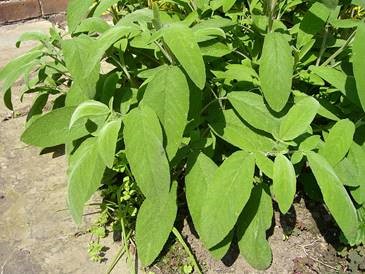
Anticancer actions of Salvia officinalis by Joseph J Collins, RN, ND
Salvia officinalis (Sage) is a popular culinary herbs that is used in cooking in many cultures. Salvia officinalis extracts have been shown to inhibit human tumor cell growth including MCF-7 breast cancer cells [1]. Salvia has also demonstrated antiproliferative actions in human breast and human prostate cancer cells [2]. Extracts from Salvia officinalis have even demonstrated some antimetastatic activity [3].
Sage extract has been found to have anticancer and antiproliferative actions on leukemia and lymphoma cells [4], [5]. This commonly used herb has anti-proliferative effects on colon cancer [6], [7]. The anticancer action of Salvia officinalis appear to be due to a number of factors that affect cancer cells including cytotoxic activity, apoptosis, cell cycle regulation, antiproliferative and anti-angiogenic [8], [9], [10], [11], [12].
Next Herb: Cimicifuga racemosa
or
Go back to the Anticancer Actions of Specific Herbs for Low Estrogen Herbs
References
To review the PubMed listing of any reference, go to www.ncbi.nlm.nih.gov/PubMed/ and enter the PubMed PMID number at the end of the reference.
[1] Loizzo MR, Tundis R, Menichini F, Saab AM, Statti GA, Menichini F. Cytotoxic activity of essential oils from labiatae and lauraceae families against in vitro human tumor models. Anticancer Res. 2007 Sep-Oct;27(5A):3293-9. PubMed PMID: 17970073.
[2] Zare Shahneh F, Baradaran B, Orangi M, Zamani F. In vitro Cytotoxic Activity of Four Plants Used in Persian Traditional Medicine. Adv Pharm Bull. 2013;3(2):453-5. doi: 10.5681/apb.2013.074. Epub 2013 Aug 20. PubMed PMID: 24312877.
[3] Jedinák A, Mucková M, Kost'álová D, Maliar T, Masterova I. Antiprotease and antimetastatic activity of ursolic acid isolated from Salvia officinalis. Z Naturforsch C. 2006 Nov-Dec;61(11-12):777-82. PubMed PMID: 17294686.
[4] Jantová S, Hudec R, Sekretár S, Kučerák J, Melušová M. Salvia officinalis L. extract and its new food antioxidant formulations induce apoptosis through mitochondrial/caspase pathway in leukemia L1210 cells. Interdiscip Toxicol. 2014 Sep;7(3):146-53. doi: 10.2478/intox-2014-0020. Epub 2014 Dec 30. PubMed PMID:26109892; PubMed Central PMCID: PMC4434108.
[5] Zare Shahneh F, Valiyari S, Baradaran B, Abdolalizadeh J, Bandehagh A, Azadmehr A, Hajiaghaee R. Inhibitory and cytotoxic activities of salvia officinalis L. Extract on human lymphoma and leukemia cells by induction of apoptosis. Adv Pharm Bull. 2013;3(1):51-5. doi: 10.5681/apb.2013.009. Epub 2013 Feb 7. PubMed PMID: 24312812.
[6] Deeb SJ, El-Baba CO, Hassan SB, Larsson RL, Gali-Muhtasib HU. Sage components enhance cell death through nuclear factor kappa-B signaling. Front Biosci (Elite Ed). 2011 Jan 1;3:410-20. PubMed PMID: 21196321.
[8] Kadioglu O, Efferth T. Pharmacogenomic Characterization of Cytotoxic Compounds from Salvia officinalis in Cancer Cells. J Nat Prod. 2015 Apr 24;78(4):762-75. doi: 10.1021/np501007n. Epub 2015 Feb 25. PubMed PMID: 25713926.
[9] Kontogianni VG, Tomic G, Nikolic I, Nerantzaki AA, Sayyad N, Stosic-Grujicic S, Stojanovic I, Gerothanassis IP, Tzakos AG. Phytochemical profile of Rosmarinus officinalis and Salvia officinalis extracts and correlation to their antioxidant and anti-proliferative activity. Food Chem. 2013 Jan 1;136(1):120-9. doi:
10.1016/j.foodchem.2012.07.091. Epub 2012 Jul 31. PubMed PMID: 23017402.
[10] Sertel S, Eichhorn T, Plinkert PK, Efferth T. [Anticancer activity of Salvia officinalis essential oil against HNSCC cell line (UMSCC1)]. HNO. 2011 Dec;59(12):1203-8. doi: 10.1007/s00106-011-2274-3. German. PubMed PMID: 21894557.
[11] Keshavarz M, Mostafaie A, Mansouri K, Bidmeshkipour A, Motlagh HR, Parvaneh S.In vitro and ex vivo antiangiogenic activity of Salvia officinalis. Phytother Res. 2010 Oct;24(10):1526-31. doi: 10.1002/ptr.3168. PubMed PMID: 20878705.
[12] Slamenová D, Masterová I, Lábaj J, Horváthová E, Kubala P, Jakubíková J, Wsólová L. Cytotoxic and DNA-damaging effects of diterpenoid quinones from the roots of Salvia officinalis L. on colonic and hepatic human cells cultured in vitro. Basic Clin Pharmacol Toxicol. 2004 Jun;94(6):282-90. PubMed PMID: 15228500.
